Randonnée de l'Amitié 1980
Part 2
From Rixensart, the route of the first stage took us first to Nismes, passing through the towns of Namur and Charleroi - a distance of around one hundred kilometres.
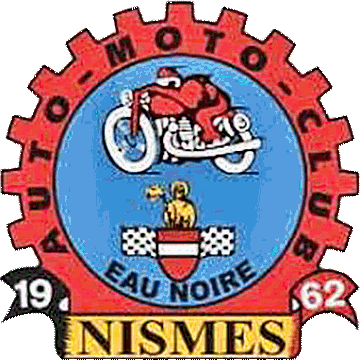
In Nismes, it was at the headquarters of the local Eau Noire motorcycle club that our route sheet received its first stamp, attesting to our passage, in the presence of the then vice-president of the FMB, the very likeable Hector Lambert, who was supervising the smooth running of operations.
During that first stop, I remember being very impressed by the relationship and close contact between the FMB delegates and their members. Unlike the French federation, not only were the delegates present at most of the Belgian tourist events, but they were also approachable and open to discussion.
I still remember the image of Jean and Suzy Delain, and François Renard, the sympathetic Chairman of the FMB's Tourism Commission at the time, chatting casually around a table with the young female president of a Belgian club. After a last cup of coffee, we headed for France, towards Châlons-sur-Marne where the second checkpoint was located.
On Thursday 1 May, with working-class France on holiday to celebrate Labour Day, traffic on the French roads was not the smoothest. Many motorists were out and about on this day. Caution was particularly advised to avoid the potential dangers that could be caused at any moment by the worst drivers in the motoring horde.
At the end of the afternoon I obtained the last stamp proving that I had passed through Nevers. Two hours later, I finally arrived at the meeting point of the Moto Club d’Auvergne, which was responsible for welcoming all the participants on arrival.
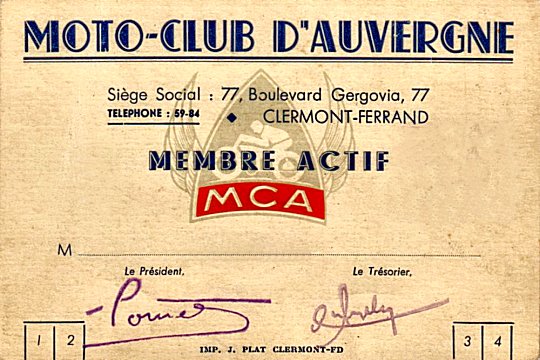
Founded in 1925, the Moto-Club d'Auvergne had its finest hours of glory between 1959 and 1974, as the centerpiece of the organization of ten French motorcycle Grands Prix which gave the Charade circuit its credentials. Note on this membership card the signature of its then president, Marcel Cornet.
It was time. MZ motorcycle saddles are not the softest and most comfortable over long distances traveled; my posterior rejoiced at the rest that was finally granted to it.
Cornet, hated by some, appreciated by others
The reception was held in the city centre of Clermont-Ferrand, in a huge amusement arcade belonging to Marcel Cornet, one of the immutable 'dinosaurs' of the French Motorcycling Federation.
For those who have never heard of the character, for almost two decades Cornet occupied a multitude of various positions at the FFM including among others that of president of the circuits commission from 1968 to 1973, president of the management committee from 1960 to 1976 and, as far as we are concerned, member of the tourism commission from 1961 to 1973.
In this position in particular, he was one of our meanest 'adversaries' at the time when we represented, with the enthusiasm of our youth, the French pirate movement uniting under its banner all the free and independent clubs (not affiliated with the FFM). A fantastic time at the beginning of the 70s when we were 'at war' against this French Motorcycling Federation which was totally deaf to our grievances, treating us as less than nothing, and even wanting, via the authorities, to have our meetings and free gatherings banned.
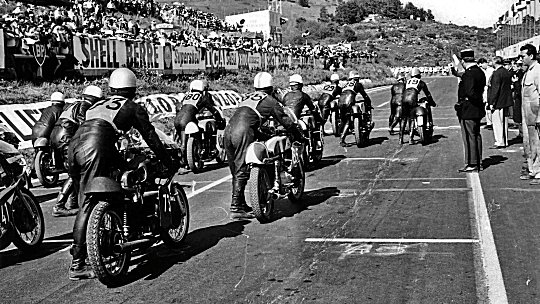
Charade 1966 – One of the many French Grand Prix organized by the Moto Club d’Auvergne between 1959 and 1974
But let's not knock the man who, I remain convinced, deeply loved motorcycling. His dedication to the promotion of this sport cannot be questioned and deserves to be recognized. Proof of this is all the various organizations that he initiated or organized in Auvergne during his reign.
Former motorcycle speed racer himself at the time when he raced in the sidecar category among others on a 1000 Vincent combo, very often without a passenger in the basket. Without him all the speed races from the end of the 1950s to 1975 (including around ten French Grand Prix) organized on the legendary mountain Charade circuit with 51 turns would certainly not have taken place.
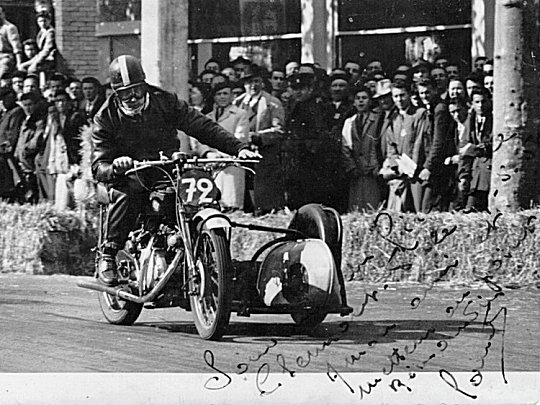
Rare autographed photo of Marcel Cornet racing on the handlebars of his Vincent, at the time when he was active in the sidecar category
Nobody is perfect. To his detriment, it seems to me that we can say without disrespect to the deceased that he did not like to be contradicted and was the opposite of a fine diplomat knowing how to use words intelligently. He was hot-blooded; and in certain conflict situations, his words were often spoken without thinking about their possible consequences, inflaming things more than appeasing them.
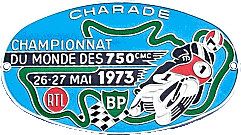
One of his most famous tantrums, corroborating my words, occurred at the end of May 1973, during the 750 World Championship organized in Charade.
A real big mess which deserves to be briefly recounted, so that no one forgets that it really took place, and to give me the opportunity to sketch for you what Cornet could be capable of in his worst moments. So let me digress from the FMB run.
Rebellion and slugfest in Charade
Because of the metal crash barriers imposed on the Charade circuit in 1972 by Formula 1, these crash barriers, which were only loosely protected in a few places by straw bales, and moreover were poorly laid out, meant that safety was virtually non-existent for the weekend's forthcoming motorbike races.
This obvious lack of a sufficient number of straw bales meant that, on Friday, some twenty French riders, via their spokesmen Christian Bourgeois and Eric Offenstadt, asked Cornet, the organisation's boss, to improve safety by adding more straw bales and arranging them more rationally. They were promised that this would be done.
Christian Bourgeois (left), spokesperson for the riders at Charade in 1975, is one of the most successful French riders with five French Champion titles and more than 100 victories to his credit; Eric Offenstadt (right), also a racer, is recognized for his design talents, including his famous aluminum beam frames.
But on Saturday morning, when the practice session should normally have started, nothing had been done to solve the problem. The discontent in the paddock took on even greater proportions and some forty French and foreign riders, including all the top names on the grid, signed a petition demanding an improvement in safety.
The afternoon was already well underway and not a single bike had entered the track since the morning. The spectators (myself included) were wondering what was going on. The organisers remained silent, not daring to explain the situation to the public.
The spectators, unaware of what was happening, grew impatient. The organisers were getting angry. As for the riders, they remained calm but firm in their demands. And as the situation was not progressing, they decided by mutual agreement to refuse to proceed with the practice session.
A very angry Cornet then began to publicly accuse Offenstadt and Bourgeois of being the ringleaders of this revolt. Bourgeois, always very calm, publicly asked for the microphone so that he could explain the situation to the public.
Cornet categorically refused and began shouting insults into the microphone while calling on the police to expel the 'ringleaders'.
Now in a rage, Cornet could no longer control himself and vomited into the microphone a litany of virulent criticisms of the riders, even going so far as to publicly call them cowards and sissies (his own words).
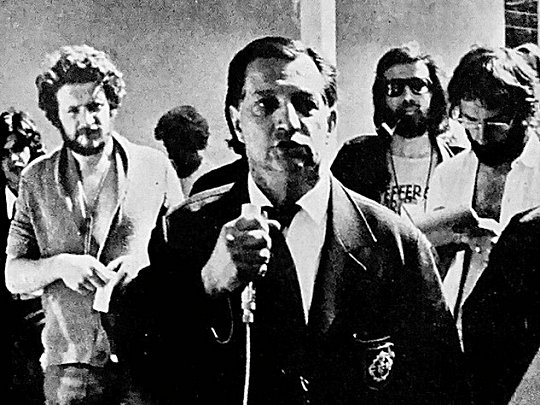
Immortalized on photo, a very angry Cornet publicly insulting the rebel pilots on the microphone
A track marshal insulted Bourgeois and punched him. Bourgeois fought back. The scene was filmed and recorded. The stewards then attacked the press. A television camera was thrown to the ground and an RTL journalist was kicked in the face several times by a cop.
The conclusion of this sordid affair was that, in the face of their wounded self-esteem, the FFM directors met on Saturday evening and punished the 'rebellious' riders, banning them from taking part in the following day's races.
The leaders Offenstadt and Bourgeois were ordered by the FFM to have their racing licences suspended for two years, and those of three national riders for life.
At the same time, Harley importer Robert Leconte sacked his rider Olivier Chevalier. The reason: not having asked his boss for permission to go on strike.
French 250cc champion in 1970, Olivier Chevallier (left) was killed in a race in April 1980, on the Paul Ricard circuit, during the Moto Journal 200: Here (right) in the paddock messing around on a bike with Chas Mortimer and Barry Sheene
The nonsense in all this is that the bales of straw requested by the riders were finally found and put in place (2500 more in total) by the organisers the night before the race.
Buffet of local culinary specialties on the menu
President Marcel Cornet's headquarters in the 60s and 70s was the Bar Brasserie de l'Univers, which he owned; a popular spot attracting young people thanks to its slot machines.
It was in one of his amusement arcades that participants in the Randonnee de l'Amitie, once they reached their destination, could check in at the registration desk.
After handing in the route sheet (duly stamped at the obligatory check-in points along the way), and paying the then-current sum of 600 Belgian Francs, each participant received a commemorative badge and a light snack, while waiting Thursday evening's copious country-style buffet offering a fine and succulent selection of culinary products from the region.
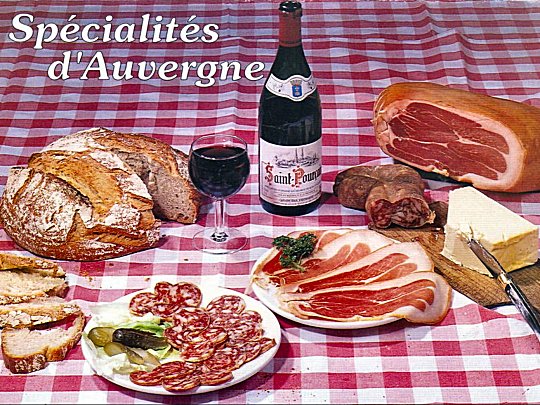
A treat for the mouth with the inimitable flavours of local produce such as cured meats and cheeses (Cantal, Saint-Nectaire, Fourme d'Ambert, Bleu d'Auvergne and Salers) from the Auvergne region
All these tasty treats were paid for by the FMB. On the other hand, members of the Moto Club d'Auvergne were on hand to welcome, supervise and serve the participants.
Optional 130km touring circuit mapped out by Bill Tournade
The optional 130km touring circuit, which took in the roads of the Sancy and the Col de La Croix St Robert, was mapped out by the late Bill Tournade, another Clermont-Ferrand motorbike touring fanatic who was also inducted by his peers into the CCM (Confrerie des Chevaliers Motocyclistes).
Although not a member of the Moto Club d'Auvergne, the ever-enthusiastic Tournade volunteered to organise that touring circuit. He even went so far as to pay out of his own pocket for the production of a commemorative ashtray to be given to each motorcyclist who took part in it.
For lunch on Friday, everyone received a bag lunch, as well as a souvenir of the region, a gift knife produced by one of the cutlery factories in Thiers.
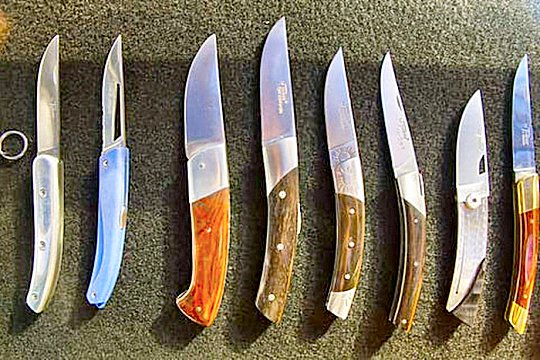
Thiers, located 42km from Clermont Ferrand, has been the French capital of cutlery for seven centuries. The city and the mountain towns that surround it are the largest cutlery area in the world. Currently the number of models produced (professional, pocket, table knives, cutting tools and cellar items) is around 20,000.
Aperitif, speeches, and trophy presentation
At the end of Friday afternoon only a small number of the 260 participants involved remained on site to attend the announcement of the results and the awards ceremony. Some had already left Clermont-Ferrand to take advantage of the weekend and wander around the Auvergne countryside. Others, eager to cover even more kilometres in the saddle in order to be able to earn valuable points allowing them to reach the top places in their national touring championship at the end of the season, had already hit the road again.
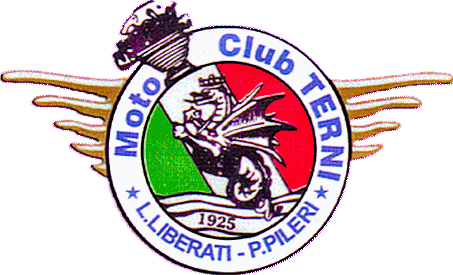
They continued their journey towards Italy, to reach Terni, a town located in the south of the Umbria region, in the center of Italy, 1100km away from Clermont Fd and about a hundred kilometres from Rome, where a rally was taking place that weekend.
At around 3pm Ricard, one of the sponsors of the Clermont-Ferrand reception, began to serve a profusion of free glasses of aperitifs.
Then came the traditional prize-giving ceremony, preceded by speeches from Francois Renard, Chairman of the FMB Tourism Commission, followed by Marcel Cornet on behalf of the FFM, who reminded his audience of his distant personal memories of motorcycle touring in his youth.
Let us note in passing the crisp humorous gesture of the Belgian Motorcycling Federation which, from the hands of Francois Renard, offered Cornet a wooden mallet similar to that used by the presidents of courts to enable him, if necessary in the future, to be able to restore order and close debates.
The Saint-Servais Moto Club received the trophy for the first classified club. A total of 25 trophies were distributed to close the event.
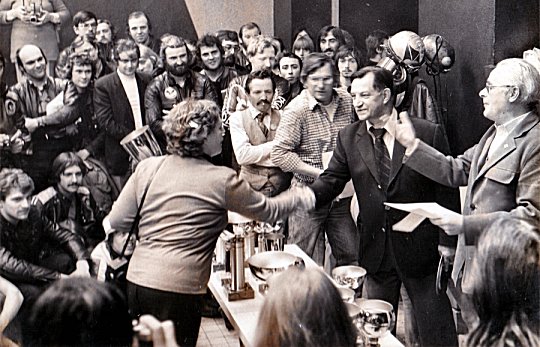
At the trophy presentation, Marcel Cornet in a suit and tie shaking the hand of a Belgian recipient; behind him Jean Delain (checked shirt); and the head of yours truly to the left of the head of Jean, in the background
I won the trophy for the (only) foreign participant and could not resist the symbolic pleasure of sending Dedette in my place. Dedette received it from the hands of Marcel Cornet, our old 'enemy' from the good old days of ‘la piraterie’, when his opponents Kiki Blanchot and the Dragons MC, like Vercingetorix and his irreducible Arverni Gauls, reigned supreme over Auvergne motorcycle touring.
- Jean-Francois Helias